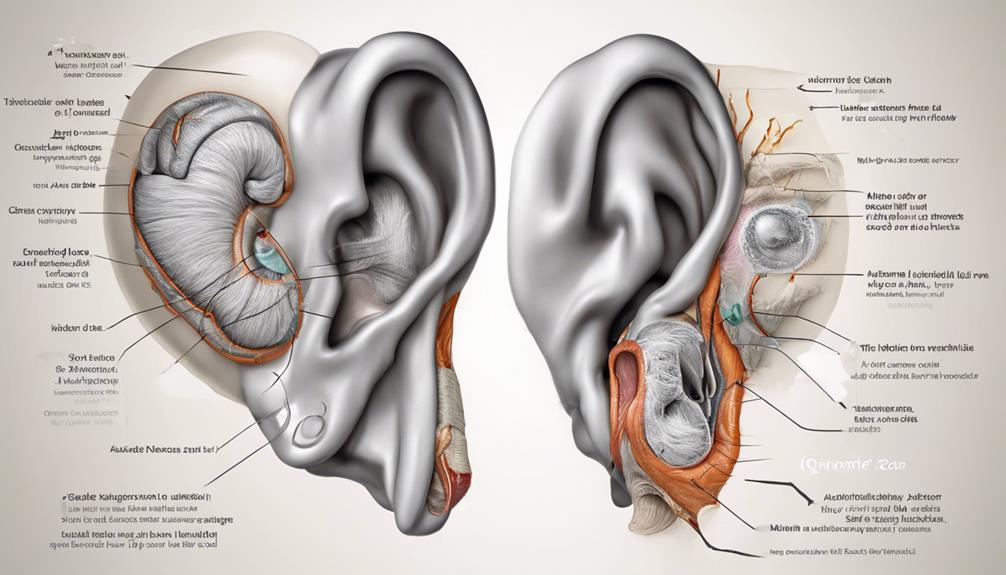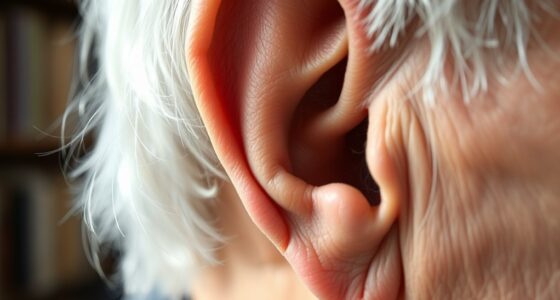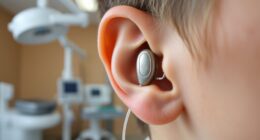Exploring the intricate relationship between leukemia and hearing loss reveals a network of connections that sheds light on the underlying mechanisms at play.
As we delve into the complexities of this connection, we come to understand the profound impact leukemia can have on one's auditory senses.
From the subtle nuances to the more overt manifestations, the journey to unraveling how leukemia can cause hearing loss is a compelling exploration that underscores the importance of early recognition and tailored interventions.
Key Takeaways
- Leukemia induces hearing loss through tumor infiltration and chemotherapy ototoxicity.
- Chemotherapy drugs harm inner ear sensory cells, affecting auditory function.
- Hyperviscosity syndrome from leukemic cells disrupts blood flow to the inner ear.
- Complications like inner ear bleeding contribute to leukemia-related hearing impairment.
Mechanisms of Leukemia-Induced Hearing Loss
Leukemia-induced hearing loss stems from various mechanisms, including tumor infiltration of ear structures and ototoxic effects of chemotherapy medications. Leukemia, a type of cancer that affects the blood and bone marrow, can lead to hearing impairment through multiple pathways.
Tumor infiltration into the inner ear, cochlea, and vestibule can disrupt the delicate structures responsible for auditory function. Additionally, chemotherapy drugs used in leukemia treatment may have ototoxic effects, damaging the sensory cells in the inner ear and affecting hearing abilities.
In some cases, hyperviscosity syndrome, a condition caused by the increased thickness of the blood due to leukemic cells, can impact hearing function by affecting blood flow to the inner ear. Furthermore, bleeding in the inner ear resulting from leukemia-related complications can contribute to hearing loss.
Even the tympanic membrane, a thin layer separating the outer and middle ear, can be affected by leukemia cells, disrupting normal auditory function and leading to hearing difficulties. Understanding these mechanisms is crucial in addressing leukemia-induced hearing loss comprehensively.
Impact of Cancer Treatments on Hearing

Cancer treatments, including chemotherapy and radiation therapy, can significantly impact hearing function in leukemia patients. These treatments can lead to hearing loss through various mechanisms, such as inner ear damage and auditory nerve impairment. The following factors contribute to the risk of developing hearing impairment during leukemia treatment:
- Chemotherapy: Certain chemotherapy drugs used in leukemia treatment are ototoxic, meaning they can damage the delicate structures of the inner ear responsible for hearing.
- Radiation Therapy: Radiation therapy for leukemia can also cause hearing loss by affecting the auditory system's function and structure, leading to long-term hearing impairment.
- Other Medications and Interventions: Antibiotics, diuretics, and surgical procedures commonly used in leukemia treatment may further exacerbate the risk of hearing loss, necessitating close monitoring through regular audiologic testing.
Understanding the impact of cancer treatments on hearing is crucial for healthcare providers to implement timely interventions and support leukemia patients in managing potential hearing challenges during their treatment journey.
Managing Hearing Loss With Leukemia
Managing hearing challenges in leukemia patients requires a comprehensive approach that encompasses regular monitoring and tailored support from specialized healthcare professionals. Children undergoing chemotherapy for leukemia are particularly vulnerable to developing hearing loss, making regular auditory testing essential for early detection and intervention.
Audiologists play a crucial role in diagnosing and treating hearing loss in leukemia patients, offering personalized care to address specific needs. Otolaryngologists are also key team members, equipped to handle complex hearing issues that may arise during leukemia treatment. By incorporating auditory testing before and throughout leukemia treatment, healthcare providers can proactively manage any changes in hearing status.
This proactive approach enables timely implementation of appropriate interventions and support strategies to mitigate the impact of hearing loss on the overall well-being of leukemia patients. Regular monitoring and collaboration between healthcare professionals specializing in leukemia and hearing health are vital components in effectively managing hearing challenges associated with this condition.
Treatment Options for Leukemia-Related Hearing Impairment

Navigating the challenges of leukemia-related hearing impairment often involves exploring a range of treatment options tailored to address individual needs and improve quality of life. When it comes to managing hearing loss in leukemia patients, several interventions can make a significant difference:
- Leukapheresis: This procedure may help reverse hearing damage in some cases by removing abnormal cells from the blood, potentially improving overall health and hearing function.
- Hearing Aids: Commonly used to amplify sounds, hearing aids can enhance auditory perception for leukemia patients experiencing hearing loss, improving communication and quality of life.
- Hearing-Assisted Technology: Utilizing innovative systems can aid individuals with leukemia-related hearing impairment in hearing more clearly, making daily interactions and activities more manageable.
In more severe instances of hearing loss, surgical options like cochlear implants may be recommended, while diagnostic imaging such as MRI and CT scans can offer valuable insights into the inner ear health of leukemia patients dealing with hearing issues. These diverse treatment modalities aim to address the multifaceted nature of leukemia-related hearing impairment and optimize patient outcomes.
Support and Resources for Individuals With Leukemia and Hearing Loss
How can individuals with leukemia and hearing loss access valuable support and resources to enhance their quality of life and well-being?
Managing hearing loss in the context of leukemia can be challenging, but there are various avenues for support and information. Online platforms like MyLeukemiaTeam offer a supportive community where individuals can connect with others facing similar experiences, fostering a sense of belonging and understanding. Additionally, seeking out medically-reviewed resources specific to leukemia-related hearing loss can provide valuable insights into available treatments and coping strategies. Subscribing to newsletters or websites that focus on leukemia and hearing loss can offer the latest information and tips for effective management.
Furthermore, engaging with articles and videos dedicated to coping with leukemia-related hearing impairment can offer additional guidance and emotional support. Building a social network of individuals who've firsthand experience with leukemia and hearing loss can also provide practical advice and encouragement. By tapping into these resources and communities, individuals can navigate their journey with leukemia and hearing loss more effectively.
Frequently Asked Questions
Why Does Leukemia Cause Hearing Loss?
Leukemia causes hearing loss through mechanisms like leukemic infiltration in the ear and ototoxicity from chemotherapy. Complications such as inner ear hemorrhage can also impact hearing function. Types like chronic lymphocytic leukemia may even present with sudden deafness.
Early detection and monitoring are vital for addressing potential hearing loss effectively. Understanding these factors can guide treatment decisions and improve patient outcomes.
What Is the Life Expectancy of a Person With Leukemia?
Our understanding of leukemia's life expectancy continues to evolve. With individual factors like type, stage, and treatment response at play, prognosis varies.
Acute leukemias, if untreated, can swiftly become fatal, but proper care can lead to remission and long-term survival. Chronic leukemias progress more slowly, allowing for years of life with ongoing management.
New treatments like targeted therapies and immunotherapies are enhancing survival rates and quality of life.
How Bad Is Stage 4 Leukemia?
Stage 4 leukemia is an advanced stage of the disease where cancer cells have spread extensively, causing severe symptoms such as fatigue, bone pain, infections, bruising, and weight loss.
Treatment involves aggressive therapies like chemotherapy, radiation, and stem cell transplantation. Prognosis varies based on factors like leukemia type and response to treatment.
Early detection and swift intervention are crucial for improving outcomes and quality of life for stage 4 leukemia patients.
How Long Does End Stage Leukemia Last?
End stage leukemia's duration varies based on the individual's response to treatment and overall health. It typically ranges from weeks to a few months. Our loved one battled end stage leukemia for two months before peacefully passing.
The prognosis is generally poor, with severe symptoms like fatigue and infections. Palliative care focuses on managing symptoms and enhancing quality of life. Close medical monitoring and support are crucial during this challenging time.
Conclusion
As we navigate the complex terrain of leukemia and its impact on hearing, we must remember to stay vigilant and proactive in seeking support and resources.
Like a symphony conductor guiding a harmonious melody, let's orchestrate a path towards managing leukemia-induced hearing loss with grace and determination.
By understanding the mechanisms at play and exploring treatment options, we can help individuals with leukemia and hearing impairments find the support they need to thrive.










